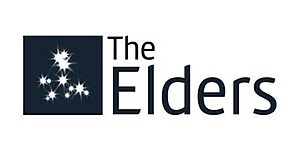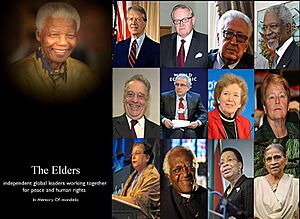The Elders (organization) facts for kids
 |
|
| Founded | 18 July 2007 |
|---|---|
| Founder | Nelson Mandela |
| Purpose | "help resolve some of the world's most intractable conflicts" and other issues. |
| Location | |
|
Members
|
12 (including 4 Elders Emeritus) |
|
Key people
|
Juan Manuel Santos (Chair) Alistair Fernie (CEO) |
|
Employees
|
18 (as of 2022) |
The Elders is a special group of global leaders who work together for peace and human rights. They are like a team of wise, experienced people from around the world. Former South African President Nelson Mandela started the group in 2007.
The Elders describe themselves as "independent global leaders working together for peace, justice, human rights and a sustainable planet." Nelson Mandela wanted them to use their many years of experience to solve big problems. These problems include climate change, diseases like HIV/AIDS, and poverty. They also help solve difficult conflicts around the world.
Contents
- The Elders: A Global Group for Good
- What The Elders Do
- Tackling Global Challenges
- Past Work and Initiatives
- Promoting Universal Health Care
- Helping Refugees and Migrants
- Strengthening the United Nations
- Addressing Climate Change
- Advancing Equality for Women and Girls
- Connecting with Young People
- Engaging with Iran
- Working on Israel and Palestine
- Supporting Myanmar's Transition
- Helping Zimbabwe
- Ending Child Marriage
- Promoting Reconciliation in Côte d'Ivoire
- Supporting Peace in Cyprus
- Addressing Tensions on the Korean Peninsula
- Working for Peace in Sudan and South Sudan
- Advocating for Sri Lanka
- Other Activities and Campaigns
- See also
The Elders: A Global Group for Good
How The Elders Began
The idea for The Elders came from English businessman Richard Branson and musician Peter Gabriel. They worked with Nelson Mandela, who was a famous anti-apartheid activist and former President of South Africa. Mandela announced the group on his 89th birthday, July 18, 2007, in Johannesburg, South Africa.
At the launch event, a chair was left empty for Aung San Suu Kyi. She was a human rights activist who was a political prisoner in Burma (now Myanmar) at the time. Many important people were there, including Kofi Annan, Jimmy Carter, Graça Machel, Mary Robinson, Desmond Tutu, and Muhammad Yunus.
Who Leads The Elders?
As of 2025, Juan Manuel Santos is the Chair of The Elders. He is a former President of Colombia and a Nobel Peace Prize winner. The group has twelve active Elders and four Elders Emeritus (who are like honorary members).
Past chairs include Mary Robinson (2018-2024), Kofi Annan (2013-2018), and Desmond Tutu (who led for six years before 2013).
Who Are The Elders?
The Elders are funded by a group of donors who believe in their mission. A small team in London helps coordinate their work.
Current Elders
- Gro Harlem Brundtland: Former Prime Minister of Norway.
- Helen Clark: Former Prime Minister of New Zealand.
- Hina Jilani: Human rights defender from Pakistan.
- Graça Machel (Co-Deputy Chair): Former Education Minister of Mozambique.
- Mary Robinson: Former President of Ireland.
- Ernesto Zedillo: Former President of Mexico.
- Ban Ki-moon (Co-Deputy Chair): Former Secretary-General of the United Nations.
- Ellen Johnson Sirleaf: Former President of Liberia, Nobel Peace Prize winner.
- Juan Manuel Santos (Chair): Former President of Colombia, Nobel Peace Prize winner.
- Zeid Raad Al Hussein: Former UN High Commissioner for Human Rights.
- Elbegdorj Tsakhia: Former President and Prime Minister of Mongolia.
- Denis Mukwege: Congolese doctor, Nobel Peace Prize winner.
Elders Emeritus
- Lakhdar Brahimi: Former Foreign Minister of Algeria.
- Fernando Henrique Cardoso: Former President of Brazil.
- Ricardo Lagos: Former President of Chile.
Important Former Elders
- Aung San Suu Kyi: She was an honorary Elder. When she was elected to parliament in 2012, she stepped down because Elders do not hold public office.
- Muhammad Yunus: Founder of Grameen Bank and Nobel Peace Prize winner. He stepped down in 2009 due to other work commitments.
Deceased Elders
- Martti Ahtisaari: Former President of Finland, Nobel Peace Prize winner.
- Kofi Annan: Former UN Secretary-General, Nobel Peace Prize winner.
- Ela Bhatt: Founder of the Self-Employed Women's Association of India.
- Nelson Mandela: Founder of The Elders, Nobel Peace Prize winner.
- Desmond Tutu: Archbishop Emeritus of Cape Town, Nobel Peace Prize winner.
- Jimmy Carter: Former President of the United States, Nobel Peace Prize winner.
What The Elders Do
The Elders use their independence and experience to work for peace, justice, human rights, and a healthy planet. Their plan for 2023–2027 focuses on three big threats: the climate crisis, nuclear weapons, and pandemics. They also work on ongoing conflicts. Across all their work, they focus on human rights, gender equality, women's leadership, and talking with young people.
Tackling Global Challenges
Fighting the Climate Crisis
The Elders want to make sure that countries and big companies take action to limit global warming. They push for fair ways to switch to clean energy. They also want to make sure that young people and women have a strong voice in climate discussions.
Preparing for Pandemics
The Elders believe that preparing for pandemics should be a global effort. They advocate for strong, publicly funded health systems that provide care for everyone.
Reducing Nuclear Threats
The Elders work for a world free from the danger of nuclear weapons. They challenge world leaders to find peaceful solutions and involve more voices, especially women and youth, in these important decisions.
Working for Peace in Conflicts
The Elders focus on supporting international law and helping in specific conflict areas where they can make a difference. They have prioritized the war in Ukraine and the Israeli-Palestinian conflict. For example, in late 2023, Mary Robinson discussed the Ukrainian Peace Formula with Ukrainian officials.
Past Work and Initiatives
Promoting Universal Health Care
From 2016 to 2022, The Elders campaigned for universal health coverage (UHC). This means everyone should have access to affordable health care. They highlighted how UHC helps achieve global health goals and benefits women, children, and teenagers.
Helping Refugees and Migrants
The Elders have spoken out about the challenges faced by refugees and migrants. They called for countries to share responsibility and protect vulnerable people. They also condemned policies that were harsh towards refugees.
Strengthening the United Nations
The Elders worked to make the United Nations stronger and more fair. They suggested ways to improve the Security Council and make the selection of the UN Secretary-General more open. Some of their ideas for selecting the Secretary-General were adopted by the UN in 2016.
Addressing Climate Change
The Elders have been active on climate change since 2009. They strongly supported the Paris Agreement on Climate Change in 2015 and continue to push for its full implementation. They also connect with young climate activists to discuss solutions.
Advancing Equality for Women and Girls
A key part of The Elders' work is promoting gender equality. They believe that women and girls have specific needs that must be addressed in all global issues, from health to peacebuilding. They have spoken out against harmful practices like child marriage and violence against women.
Connecting with Young People
Nelson Mandela encouraged The Elders to listen to young people. The Elders often meet with young activists to discuss peace, equality, and protecting the environment. They have held discussions with young people about revolutions, refugee crises, and UN reform.
Engaging with Iran
The Elders have visited Iran to encourage more open talks between Iran and the international community. They supported the nuclear agreement reached in 2015, believing it was a chance to build trust.
Working on Israel and Palestine
The Israeli–Palestinian conflict has been a top priority for The Elders. They believe the international community must help Israelis and Palestinians find a lasting solution based on human rights and international law. They have called for an end to the blockade on Gaza and for a two-state solution.
Supporting Myanmar's Transition
The Elders visited Myanmar several times to support peace and development. They welcomed the elections in 2015. They also supported Kofi Annan's work to assess the situation in Rakhine State and address the challenges faced by the Rohingya community.
Helping Zimbabwe
The Elders have been concerned about Zimbabwe since 2007. They tried to visit in 2008 to highlight humanitarian crises but were denied entry. They continue to support the people of Zimbabwe and human rights defenders.
Ending Child Marriage
The Elders are dedicated to ending child marriage. They visited Ethiopia and India to learn about the issue and support efforts to stop it. In 2011, they started the Girls Not Brides partnership, which became an independent organization in 2013.
Promoting Reconciliation in Côte d'Ivoire
After violence in Ivory Coast in 2010, The Elders worked to support peace and healing. They encouraged reconciliation and emphasized the importance of improving security.
Supporting Peace in Cyprus
The Elders have visited Cyprus multiple times to support peace talks between the Greek Cypriot and Turkish Cypriot communities. They encourage dialogue and understanding of their shared history.
Addressing Tensions on the Korean Peninsula
In 2011, The Elders visited South Korea, North Korea, and China to help ease tensions on the Korean Peninsula. They encouraged dialogue and addressed humanitarian concerns.
Working for Peace in Sudan and South Sudan
Peace in Sudan has been a priority since The Elders were founded. They visited Sudan in 2007 and supported the peace agreement between North and South Sudan. They have continued to advocate for peace and humanitarian aid in the region.
Advocating for Sri Lanka
The Elders have followed developments in Sri Lanka since its civil war ended in 2009. They have stressed the importance of reconciliation and accountability for human rights violations.
Other Activities and Campaigns
Engaging with Russia
In 2015, The Elders visited Moscow to discuss global issues with Russian officials, including President Putin.
Digital Discussions and Podcasts
The Elders have launched digital discussions called "State of Hope" to explore global challenges. They also produced a podcast series called "Finding Humanity" during the COVID-19 pandemic, focusing on empathetic leadership.
#WalkTogether Campaign
To mark their 10th anniversary in 2017, The Elders launched the #WalkTogether campaign. This global effort aimed to inspire hope and bridge divides, celebrating communities that work for unity and compassion.
Every Human Has Rights Campaign
In 2007, The Elders launched the Every Human Has Rights campaign to highlight the principles of the Universal Declaration of Human Rights. They partnered with many organizations to empower people to protect human rights worldwide.
See also
 In Spanish: The Elders para niños
In Spanish: The Elders para niños
 | Frances Mary Albrier |
 | Whitney Young |
 | Muhammad Ali |


